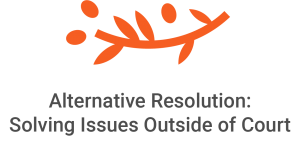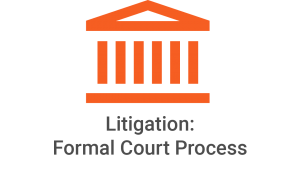FAQ
When you chose to go to court, you ask a stranger to determine the outcome of your case instead of making your own decisions by agreement. In court, a stranger makes a decision on your behalf after hearing the arguments that you and the other side make against each other. At A to Z Law Erie, we firmly believe that it is better to resolve your issues outside of court, where you get to maintain more control over the outcome as well as the process. Solving issues outside of court gives you the opportunity to focus on what is most important to you and your family, and to reach your own decisions by agreement. By working toward agreement, you and the other party both get the chance to resolve conflict underlying the issues, which can lead to long-term solutions to problems. A and Z are professional problem solvers, here to help you resolve your issues with dignity and respect, using processes that are specifically designed to make peacemaking possible.
Peacemaking is a word to describe our philosophy of resolving issues peacefully, with dignity and respect – and hopefully, outside of a courtroom. As peacemakers, A and Z are committed to conflict resolution. Resolving the conflict underlying legal issues leads to long-term solutions, and the possibility for healing rather than hurting. Even cases that go to court can be approached with dignity and respect. This is what we do, as attorneys, mediators, collaborative professionals, and allies.
Peacemaking Processes are recognized and accepted methods for resolving your legal issues outside of court. These processes empower you to make decisions and reach agreement by addressing and seeking to resolve the conflict underlying the issues, with professional guidance. This type of resolution is healthier and more effective than a temporary fix to ongoing problems. Your process options at A to Z Law Erie include the Collaborative Process, Mediation, and Unbundled Services. Read more about each of these Peacemaking Processes below, and visit our “Your Process Options” page for additional information.
The Collaborative Process is a full-service, team-based Peacemaking Process. The parties voluntarily agree to stay out of court and commit to working together with the help of a team of Collaborative Professionals to reach agreement and resolution. Each case is unique, so the members of your team will depend upon what you and the other party need, want, and agree to. A significant benefit of the Collaborative Process is that the professionals work together collaboratively, rather than duplicating work or actively working against each other. This includes the attorneys that each party generally hires separately, as well as any other supporting roles that the parties choose together and usually hire jointly, as neutral professionals. The avoids duplication of effort, time and expenses. Even more importantly, this holistic approach focuses resources and energy on resolving the conflict underlying the legal issues. This type of conflict resolution can be transformative, particularly for families.
Mediation is a cooperative Peacemaking Process that relies upon a neutral professional to help you and the parties reach agreement outside of court. A Mediator works as a professional, neutral third-party to help you and the other party communicate clearly, negotiate effectively, and reach agreement based upon unique solutions to your issues. By guiding clear communication between the parties, a Mediator helps to unambiguously identify what each party needs and wants. Once both parties’ interests are on the table, a Mediator helps the parties to focus on their goals, and then to negotiate toward potential solutions. A Mediator can help you and the other party find unique solutions to your problems that take your needs, interests, and goals into account. Negotiated solutions to legal issues often help to address the underlying conflict between the parties, which leads to long-term solutions.
Unbundled Services refers to the idea of providing individualized solutions based upon your legal issues, circumstances, and goals, offering only as much peacemaking assistance as you need or want. This might mean having an attorney prepare and file legal documents based upon an agreement that you’ve already made. It also might mean getting help with understanding your options, or developing potential solutions, or another specific service that we can agree to provide. The scope of Unbundled Services depends entirely on what you are looking for.





